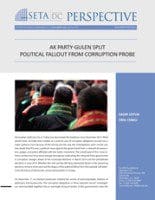
AK Party-Gulen Split: Political Fallout From Corruption Probe
January 16, 2014What should have been treated as a judicial case of corruption allegations turned into a major political crisis.
Yet another political crisis in Turkey has dominated the headlines since December 2013. What should have normally been treated as a judicial case of corruption allegations turned into a major political crisis because of the timing and the way the investigations were carried out. Few doubt that this was a political move against the government from a network of prosecutors, judges, and police affiliated with the Gulen movement. The overall goal of this move remains unclear but it has done enough damage by implicating the ruling AK Party government in corruption charges ahead of the municipal elections in March 2014 and the presidential elections in June 2014. Whether this will cost the AK Party substantial losses in the upcoming elections remains to be seen but the legacy of the political fallout from this episode will determine the future of democratic conservative politics in Turkey.
On December 17, an Istanbul prosecutor ordered the arrests of businesspeople, relatives of politicians and bureaucrats. The corruption allegations in three separate “secret” investigations were bundled together into an overnight string of arrests. In the government’s view, the investigations were politically motivated and they were timed and packaged in a way to create an outsized effect to embarrass and perhaps to bring down the government. It was troublesome that both the prosecutor and the police chiefs conducting the raids had kept these investigations secret from their immediate superiors for more than a year. The investigations were not posted to the police intranet to avoid oversight and the prosecutor kept the investigation under wraps from the Chief Prosecutor. Moreover, to win over public opinion in the very first hours of the investigation, the police leaked alleged evidence (such as cash being stored in shoeboxes) to media outlets. Similar tactics had been used before, during investigations into the army officers as well as during the match-fixing investigations into the Fenerbahce football club.
In the latest graft probe, instead of acting at the time of the alleged wrongdoings, a network of police chiefs and prosecutors had compiled dossiers on influential figures close to the government for a politically opportune time in the future. When the time was right, these separate investigations were brought together and put to “good use.” The arrests came in the wake of the political fight over the closure of the university exam prep schools, institutions from which the Gulen movement has benefited over the years both financially and in terms of human capital. On the eve of the upcoming municipal elections in March, the ruling party seemed most vulnerable to political scandals. As the Gulen movement failed to force the government into canceling its plans to close down the prep schools (although a modified version of the law delayed it to 2015), the time seemed ripe for an all-out political assault on the Erdogan government... Continue Reading




























